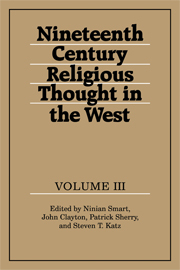Book contents
- Frontmatter
- Contents
- Preface
- 1 RELIGION AND SCIENCE
- 2 FRIEDRICH NIETZSCHE
- 3 JEWISH THOUGHT
- 4 THE STUDY OF THE OLD TESTAMENT
- 5 THE STUDY OF THE NEW TESTAMENT
- 6 FRIEDRICH MAX MÜLLER AND THE COMPARATIVE STUDY OF RELIGION
- 7 THE ANTHROPOLOGY OF RELIGION: BRITISH AND FRENCH SCHOOLS
- 8 MAX WEBER AND GERMAN SOCIOLOGY OF RELIGION
- 9 ERNST TROELTSCH
- INDEX
9 - ERNST TROELTSCH
Published online by Cambridge University Press: 26 January 2010
- Frontmatter
- Contents
- Preface
- 1 RELIGION AND SCIENCE
- 2 FRIEDRICH NIETZSCHE
- 3 JEWISH THOUGHT
- 4 THE STUDY OF THE OLD TESTAMENT
- 5 THE STUDY OF THE NEW TESTAMENT
- 6 FRIEDRICH MAX MÜLLER AND THE COMPARATIVE STUDY OF RELIGION
- 7 THE ANTHROPOLOGY OF RELIGION: BRITISH AND FRENCH SCHOOLS
- 8 MAX WEBER AND GERMAN SOCIOLOGY OF RELIGION
- 9 ERNST TROELTSCH
- INDEX
Summary
The great German historian Friedrich Meinecke (1862–1954) described Ernst Troeltsch as ‘one of the most outstanding and powerful minds of our time’. Such a comment from a contemporary historian makes it all the more remarkable, as has been recently pointed out, that Troeltsch's work was ‘not taken seriously for nearly forty years’ after his death in 1923. Only lately has interest been reawakened in Troeltsch's complex theological and philosophical position. It is true that Troeltsch worked largely within the ‘thought forms of the nineteenth century’. But he also posed questions with a growing intensity about the possibility of reconstructing theology in a way that would aid what he called a ‘fresh characterization of the essence of Christianity’. Thus Troeltsch must be seen today as an important and farsighted twentieth-century thinker. Certainly he did feel he was engaged with the great representatives of theology and philosophy since Kant, Hegel and Schleiermacher, but not merely in a historical way. For he realized more than virtually any other contemporary the necessity of interpreting this ‘classical’ heritage for a future in which the concepts and ideas of the nineteenth century would be fundamentally remodelled and reshaped through the force of a great historical upheaval.
Troeltsch saw himself as preparing the way for this future. He looked for ways of adapting academic work in theology, philosophy, history and sociology to this future, and of contributing to its construction, by taking an active part in the ecclesiastical and political debates of his time.
- Type
- Chapter
- Information
- Nineteenth-Century Religious Thought in the West , pp. 305 - 332Publisher: Cambridge University PressPrint publication year: 1985



